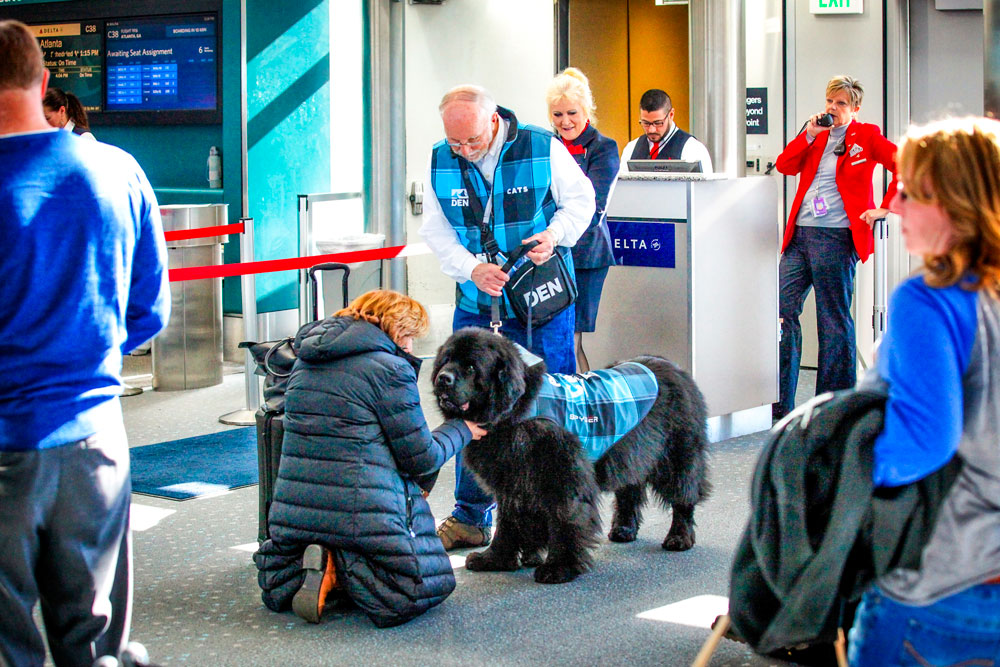Dogs at your service
By Kathy Fallert; courtesy photo

Wilson, a Newfoundland from Highlands Ranch that is part of the Canine Airport Therapy Squad (CATS), loves swimming and his favorite treat is a big carrot. His biggest pet peeve is getting his faced wiped by his mom. Like any true Coloradan, he loves to lay in any patch of snow he can find.
Pets provide health benefits. According to studies, pets can increase fitness, lower stress and improve happiness. Service dogs encompass all of these abilities, and combined with training to perform specific tasks, help individuals with disabilities.
An emotional support animal (ESA) provides comfort just by being with a person. An ESA can be any domestic animal from dogs to hedgehogs to mice. Since these animals are not trained to perform a specific job or task for a person with a disability, they do not qualify as service animals under the American Disabilities Act (ADA). ESAs are not allowed access to public facilities under the ADA. Some states have enacted laws to allow owners to take an ESA into public places.
Travelers at Denver International Airport (DIA) may have met the airport’s ESAs – the DEN CATS (Canine Airport Therapy Squad). This is a squad of more than 100 dogs of over 40 breeds and one cat. They are part of the largest airport therapy animal program in the country. You’ll see them in their blue plaid “pet me” vests throughout DIA. You can hug, pet and take pictures with these four-legged volunteers to help relieve any travel anxiety.
A companion to ESAs is the highly-trained service dog. According to the ADA, a service animal is “a dog that is individually trained to do work or perform tasks for a person with a disability.” A disability can be physical, sensory, psychiatric, intellectual or other mental disability. The benefits a service dog provides continue to expand. In the 1920s, a service dog was commonly a seeing eye dog, namely a German Shepherd. Modern day service dogs are trained from many different breeds and perform an amazing variety of tasks to assist disabled individuals.
Service dogs can perform such tasks as pulling a wheelchair, retrieving dropped items, helping a visually impaired person navigate their environment, or alerting a deaf person to sound. A service dog helps a person with a disability lead a more independent life. Medical alert dogs can also signal the onset of a medical issue such as a seizure or low blood sugar. Psychiatric service dogs can assist people with PTSD, schizophrenia and other conditions. These dogs can enter a dark room and turn on a light or remind a person to take their medication. The type and size of a service dog varies based on the need, but the most common service dog breeds are Labrador retrievers, golden retrievers and German shepherds. It costs about $25,000 to train a service animal.
The ADA does not require service dogs to wear vests or display identification. Unfortunately, some people abuse the service dog laws and misrepresent their dogs as service animals. A poorly-trained, fake service animal can be a danger to the public and to real service dogs, undermining the reputation of legitimate service dog users. Misrepresentation of service animals is illegal in Colorado.
Whether a furry companion is there to help perform daily tasks, help relieve anxiety, or is a member of the family – the reciprocal relationship is beneficial to all.
